- All Minecraft Villager Jobs in 2024
- 1) Armorer
- 2) Butcher
- 3) Cartographer
- 4) Cleric
- 5) Farmer
- 6) Fisherman
- 7) Fletcher
- 8) Leatherworker
- 9) Librarian
- 10) Mason
- 11) Shepherd
- 12) Toolsmith
- 13) Weaponsmith
- 14) Nitwit
- 15) Unemployed
- Wandering Trader
- How to change Minecraft villager jobs
- How to get Minecraft villager jobs (Villager job blocks)
- Minecraft Villager Trading Rebalance explained
- Minecraft Villager Jobs FAQs
Minecraft villager jobs are arguably the most useful feature you can use in the game. Villager jobs make it easy to get your hands on powerful enchantments, tasty cooked meat, or even rare diamond gear. These passive mobs are your go-to for trading and crafting essentials.
But not all villagers are created equal. In this guide, we will break down all the villager jobs in Minecraft and what each one offers. With around 15 different professions to explore, there’s a lot to discover. So, let’s dive in and learn how to unlock the full potential of the village trading system in Minecraft!
Also Read: Best Minecraft 1.21 seeds
Chart New Territories with the ultimate Minecraft Seed Generator!
All Minecraft Villager Jobs in 2025

Minecraft has 15 types of villager jobs, with 13 being unique professions that provide valuable trades to players, while the other two — nitwit and unemployed — are non-job statuses. Nitwits can't take on jobs, and unemployed villagers need jobsite blocks placed nearby to become professionals.
Here’s a look at villager jobs available in the latest Minecraft 1.21 update, along with the villager job blocks needed to assign these professions:
When players trade with villagers, the villagers gain experience and unlock new trade options, starting as novices and progressing as trading continues. To assign jobs to unemployed villagers in Minecraft, players must create and place specific jobsite blocks near them.
1) Armorer

- Job block: Blast Furnace
- Trades armors, shields, and bells
A blast furnace block in Minecraft turns a villager into an armorer, who specializes in working with and trading armor. They’re willing to trade away items like iron armor, shields, and bell blocks. At expert and master levels, players can purchase enchanted diamond armor pieces from armorers with emeralds
2) Butcher

- Job block: Smoker
- Trades food-related items
A smoker block turns a villager into a butcher, who buys raw meats from players and sells cooked meats. In addition to offering trades for cooked pork chops and chicken, novice-level butchers will also provide rabbit stew to players for the low cost of a single emerald. At higher levels, butchers will also purchase dried kelp blocks, sweet berries, and raw beef/mutton.
Also check: Seed Generator Minecraft
3) Cartographer
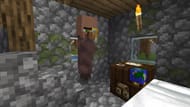
- Job block: Cartography Table
- Trades items like explorer maps, normal maps, and banners
A cartography table turns a villager into a cartographer, a villager who specializes in maps. Cartographers can sell empty maps, as well as ocean and woodland explorer maps, and their offerings expand as they gain experience.
By the time it reaches the expert and master level, the cartographer can also sell item frames, blank banners of various colors, and the globe banner pattern.\
Also Read : Best Minecraft trident enchantments
4) Cleric
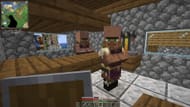
- Job block: Brewing Stand
- Trades redstone dust, lapis lazuli, Bottles O’ Enchanting, and ender pearls.
A brewing stand turns a villager into a cleric, who specializes in potions and trades brewing ingredients like redstone dust and lapis lazuli. They’re willing to buy the fairly useless rotten flesh item, and they even offer glowstone blocks and ender pearls as they gain experience levels.
Best of all, master-level clerics will make Bottles O’ Enchanting available for purchase.
5) Farmer
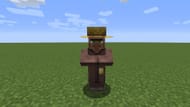
- Job block: Composter
- Trades melons, pumpkins, and other crops
A composter turns a villager into a farmer, who tends farm plots and trades crop farming-related items with players. In addition to buying most in-game crops, farmers can sell plenty of food items like bread, apples, cake, and cookies. At the highest profession levels, farmers will also sell various suspicious stews, golden carrots, and glistering melon slices.
While these villagers trade with players, they’re also responsible for feeding their fellow villagers. This is one of the core components of raising the willingness of villages so that they can breed if beds are available. Farmers are one of the best villager jobs for farming emeralds.
6) Fisherman

- Job block: Barrel
- Trades coal, various fishes, and boats
A barrel turns a villager into a fisherman, who trades raw fish, coal, and string. Furthermore, this is another one of the villager professions that sell food items like cooked cod and salmon, as well as buckets of live cod and even campfire blocks as they progress through their profession levels. Best of all, journeyman-level fisherman will sell enchanted fishing rods to players who can pony up the emerald cost.
7) Fletcher
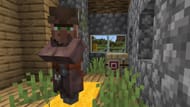
- Job block: Flectching Table
- Trades sticks, bows, and arrows
A fletching table turns a villager into a fletcher in Minecraft. This profession centers on bows and crossbows, varieties of arrows, as well as crafting ingredients like string and flint.
At expert and master experience levels, fletchers will even sell enchanted bows and crossbows as well as tipped arrows that bestow various status effects.
8) Leatherworker
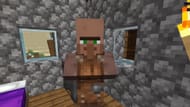
- Job block: Cauldron
- Trades saddle, leather, leather armor, and more
A cauldron turns an unemployed villager into a leatherworker in Minecraft. As the name implies, leatherworkers provide pieces of leather armor, both for players and for horse mobs.
Furthermore, at their maximum level of master, leatherworkers will also sell saddles for riding various in-game mobs.
9) Librarian
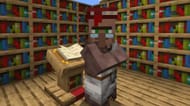
- Job block: Lectern
- Trades various enchantments, bookshelves, and name tags
A lectern turns a villager into a librarian, one of the most overpowered villager profession in Minecraft. In addition to offering the likes of lanterns, bookshelves, clocks, compasses, and nametags, librarians sell enchanted books. Depending on the trade, players can get some very impressive enchantments early on just by trading with a librarian villager.
Librarians have also been reworked as part of changes to Minecraft villager jobs. The enchantments they offer now depend on the biome they call home as well as their profession level, with the best enchantments only being provided for sale at master level.
10) Mason

- Job block: Stonecutter
- Trades terracotta, bricks, dripstone, and other stone block
A stonecutter block turns a villager into a mason, who works with various stone and clay blocks. In addition to selling bricks, masons offer polished andesite, diorite, and granite, as well as dripstone blocks. At higher levels, masons are also willing to part with colored and glazed terracotta and even quartz blocks.
11) Shepherd
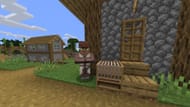
- Job block: Loom
- Trades wool-related items
A loom block turns a villager into a shepherd, who trades dyes and wool blocks in Minecraft. Most of their trades are centered around buying dyes and wool blocks, but they begin to offer sales at higher levels.
At the novice level, shepherds will offer shears, but as they gain experience, they can also sell wool, beds, carpets, and banners of any color. Master shepherds will also sell paintings for emeralds, though this isn’t the best trade opportunity.
12) Toolsmith

- Job block: Smithing Table
- Trades tools like axe, pickaxe, and shovel
A smithing table turns a villager into a toolsmith, who specializes in trading tools like pickaxes, axes, and shovels. As their experience levels climb, they offer tools of higher quality. This includes not just diamond tools but enchanted diamond tools that are worth their weight in emeralds, making toolsmith a villager worth having in your world.
13) Weaponsmith
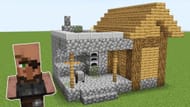
- Job block: Grindstone
- Trades swords and axe
A grindstone block turns a villager into a weaponsmith, who specializes in trading iron weapons and enchanted iron swords. Even at early levels, weaponsmiths offer iron weapons like swords and axes, including enchanted iron swords.
At their highest levels of progression, weaponsmiths are also willing to sell enchanted diamond axes and swords for a decent emerald price. It is one of three villager professions that offer diamond gear in exchange for emeralds.
14) Nitwit
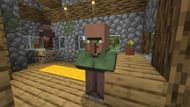
Nitwits may look like regular villagers, but they have a few key differences. They wear green robes instead of the typical villager attire, and they can't take on any jobs, making them unhelpful for trading.
Additionally, nitwits wake up and go to sleep later than other villagers, often putting them at risk of being killed by zombies at night. Fortunately, nitwits are rare in Minecraft, so encountering one is uncommon.
15) Unemployed
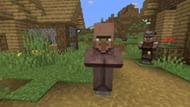
Unemployed villagers are simply villagers without a profession, which can happen for a few reasons. There may not be enough job blocks available in the village, or their path to a job block could be obstructed.
Sometimes, a villager becomes unemployed after switching professions too many times, triggering a cooldown. The good news is that you can assign a job to an unemployed villager by placing a job block in front of them.
Wandering Trader
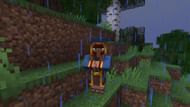
- Trades flowers, dyes, seeds, and more
Although the Wandering Trader isn’t technically one of the Minecraft villager jobs, it does resemble a villager and offers trades like them as well. It tends to offer up natural resources or those that aren’t easily renewed, though the prices for its transactions vary and often can be somewhat overpriced.
Wandering Traders spawn randomly around a player's location and eventually despawn after some time. Players are recommended to check out their trades and see if there's anything worth buying. These nomad villagers have a wide variety of trades, ranging from rare flowers to diverse saplings.
Fortunately, Minecraft’s 23w31a snapshot has reworked the Wandering Trader so that it can buy certain materials from players in addition to selling them. Furthermore, the trader’s prices were adjusted to be more sensible and helpful by expanding the mob’s inventory.
How to change Minecraft villager jobs
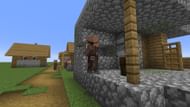
If players aren't happy with a villager's current job, they can easily change it by placing the appropriate job block nearby at the right time of day. Villagers don't work early in the morning or late at night, but during their working hours, switching a job is straightforward.
To switch a villager's job, follow these three simple steps:
- Identify and break the current job block: Locate the job block the villager is using and break it. This will turn the villager into an unemployed one.
- Place the new job block: During regular working hours, place the new job block you want the villager to bond with. Ensure the villager has unobstructed access to the block.
- Wait for the villager to claim the block: The villager should move to the new job block and take on the corresponding profession, starting at the novice level.
How to get Minecraft villager jobs (Villager job blocks)
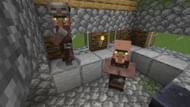
Villagers need a job site block to acquire a profession. If you notice several unemployed villagers, simply place job site blocks within the village, ensuring they are accessible. The villagers should pick up their jobs during their regular daily activities, as long as the blocks are within reach.
The lone exception to this rule involves nitwit villagers who wear green tunics. These villagers are incapable of trading or acquiring a job at all.
Each villager requires their own job site block, as multiple villagers cannot share the same workstation. Other factors like housing, bedding, or food won't affect their ability to get a profession, as long as they have access to a job block.
Here is a list of all villager job blocks in Minecraft and the items needed to craft them
Minecraft Villager Trading Rebalance explained
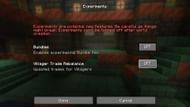
Villager trading rebalance is an experimental optional feature available when creating a new world in Minecraft. With this rebalance, Mojang plans to nerf the trades of overpowered villager jobs like librarians and armorers, while buffing weaker jobs such as cartographers.
Cartographers will sell a variety of explorer maps based on their biomes, and librarians’ enchanted book trades will become biome-dependent, limiting the enchantments you can obtain from them. This aims to encourage players to explore diverse biomes and villages in their Minecraft worlds.
To try the villager trading rebalances, create a new world and enable Villager Trade Rebalance datapack under Experiments in Java Edition or Villager Trade Rebalancing (Bedrock) setting under Experiments section in Bedrock Edition. Note that these changes are experimental, and there's no guarantee they will be added to the game.
Also Read : How to duplicate armor trim in Minecraft
Minecraft Villager Jobs FAQs
1) Why villager is not losing job?
A villager won't lose their job if it has already completed a trade. There is no way to change a villager's job if a player has already traded an item with it. If a village's XP bar is above zero or it has unlocked more than two trades, then it cannot lose its job.
2) Are there jobless villagers?
In Minecraft, players can come across villagers without jobs, known as "nitwits." Nitwits don't pick a job when near workstation blocks. They tend to stay up late, sleep in, and enjoy playing with baby villagers.
3) Why won't villagers take the job?
Check if the villager isn't a nitwit, as they can't do jobs. Nitwits wear unique green clothing. If a normal villager isn't taking a job, it might mean another villager is using the workstation. Players should try adding more workstation blocks and be patient.
4) Why are villagers not restocking their trades?
Villagers can only refill their trades if they can access their workstations. If it's too far away, they won't restock. Villagers are known to restock their trades twice a day in Minecraft.
5) Which villagers sell diamond weapons, armor, and tools in Minecraft?
Players can trade with master-level weaponsmiths to get diamond weapons, master-level toolsmiths to get diamond tools, and master-level armorers to get diamond armor pieces. Most of them come along with useful enchantments as well.
6) What villager job is the best in Minecraft?
Weaponsmith, armorsmith, and toolsmith are considered as the best villager jobs in Minecraft. These villagers can sell enchanted diamond equipment in exchange for emeralds. Other than these three, librarians and farmers are also great for farming emeralds and unlimited food supply.
Check out our Minecraft Topics:
- Best Minecraft mods
- Best Minecraft servers
- Best Minecraft Bedrock seeds for 1.20
- Popular Minecraft texture packs
- Best Minecraft shaders
- Best Minecraft enchantments
- Best Minecraft commands
- Best Minecraft house ideas
Uncover new worlds with our Minecraft Seed Generator!

